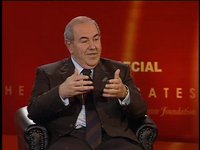Doha Debate Special Event: former Iraqi Interim Prime Minister, Dr. Ayad Allawi
Wednesday October 31 2007
MOTION REJECTED
Transcript
Order of speeches
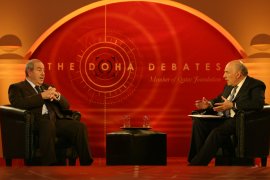
- Introduction
- Audience questions: was life better under Saddam?
- Ending sectarian
- Dealing with insurgents and terrorists
- His vision for Iraq
- Responsibility
- Women's rights
- US troop withdrawal
- Iran
- Breaking up Iraq
- Regrets
- Dealing with the threat of assassination
- Proudest moments
Introduction
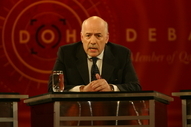 TIM SEBASTIAN
TIM SEBASTIAN
Hello and welcome to this Doha Debates Special event sponsored by the Qatar Foundation. Iraq is never out of the news for more than a few hours, and my guest today has generated plenty of headlines there. He's a powerful and controversial figure in the country. Once a loyal supporter of Saddam Hussein, he became the first Prime Minister in the country after the US-led invasion. He suffered assassination attempts but is said by his opponents to have been partly responsible himself for a number of deaths. He's been accused of many things but never of weakness or lack of ambition. He wants of all things to become Iraq's Prime Minister once again. Ayad Allawi, welcome to the Doha Debates.
Audience questions: was life better under Saddam?
AYAD ALLAWI
Thank you, thank you for having me here.
TIM SEBASTIAN
Why do you want it again? It didn't go so well last time, did it?
AYAD ALLAWI
No, unfortunately not. We couldn't finish the route to stabilise the country.
TIM SEBASTIAN
You promised law and order, you couldn't bring it, could you?
AYAD ALLAWI
Well, we did our best. We brought a lot of law and order but we couldn't finish the task, because of the election, premature elections.
TIM SEBASTIAN
Not much law and order in Fallujah and Najaf, was there?
AYAD ALLAWI
No, but it was brought to law and order.
TIM SEBASTIAN
But at what price? What price? One British official called it a possible war crime, there was phosphorous used, you saw the pictures, helicopter gun ships strafing civilians on the streets.
AYAD ALLAWI
This was not in my time. This was in Bremer's time.
TIM SEBASTIAN
This was in 2004. You were still a member of the governing council.
AYAD ALLAWI
But not the Prime Minister.
TIM SEBASTIAN
Why didn't you object to it?
AYAD ALLAWI
We did.
TIM SEBASTIAN
Some did, you didn't.
AYAD ALLAWI
No, we did. I opened a dialogue with the Fallujah resistance, with the insurgents, and I continued the dialogue after I became Prime Minister, and some of them now have joined the political process.
TIM SEBASTIAN
But you were part of the decision-making process that went ahead with Fallujah which was possibly a war crime. Do you think it was a war crime?
AYAD ALLAWI
No. You are talking I think on two issues. The first is the Bremer time, when Bremer decided that it's time to take action and I'm not party to this and I don't know what happened. The second time I was the Prime Minister when I made the decision. I argued with the Fallujah people, I did open a dialogue with the resistance, and I was very clear that we needed them to surrender Zarqawi and his people..
TIM SEBASTIAN
And the loss of life?
AYAD ALLAWI
Well, you have to, you have to bring ...
TIM SEBASTIAN
So you just dismiss it as, 'You have to'?
AYAD ALLAWI
No, you have to use force, you have to use dialogue. You can't just have a daydream and say that we are going to bring order and law in the country.
TIM SEBASTIAN
We've had dialogue, we've had force in the last four years and it has achieved absolutely nothing.
AYAD ALLAWI
No, during my time, we produced some very concrete results, and getting a lot of people especially the insurgents in Fallujah. Now they are in office.
TIM SEBASTIAN
But you call this a failing state now, so what did you achieve? You say it's a failing state.
AYAD ALLAWI
Now, now it's a failing state, yes. Well, we don't have a state, we may have a government, but we really don't have a state as such, we don't have institutions. The institutions were dismantled.
TIM SEBASTIAN
But you don't accept any of the blame for this failing state?
AYAD ALLAWI
No, I said of course I was part of the opposition against Saddam. We talked and had a dialogue with the Americans.
TIM SEBASTIAN
Eventually. You were a supporter originally of Saddam, weren't you?
AYAD ALLAWI
I was part of the Ba'ath Party.
TIM SEBASTIAN
You helped him into power in 1968.
AYAD ALLAWI
Unfortunately yes.
TIM SEBASTIAN
Is that a source of shame for you?
AYAD ALLAWI
No, it's not, but with hindsight the problems started since then when he decided to take over the Ba'ath Party and to confiscate the Ba'ath Party and to inflict loss on Iraq and tyranny and we had to embark two years later on an approach of opposing him, and this is what I did. I just then graduated from medical school and I had to leave the country because there was a purge in the country and I was purged with other leaders in the party.
TIM SEBASTIAN
You weren't a paid member of the secret police, the Mukhabarat, when you were in London?
AYAD ALLAWI
No, no, God forbid.
TIM SEBASTIAN
No? And the fact that Vincent Cannistraro, a senior CIA officer, referred to you as responsible for some of the dirty stuff and said you have blood on your hands from your time in London?
AYAD ALLAWI
Well, they like to accuse people of various things.
TIM SEBASTIAN
But they were your friends, weren't they, the CIA?
AYAD ALLAWI
I knew the CIA, I knew the MI6, I knew some of the Arabs, this is part and parcel of talking to the United States, part and parcel of talking to Britain, and part and parcel of talking to other leaders.
TIM SEBASTIAN
So you were never involved in the dirty stuff.
AYAD ALLAWI
Never ever.
TIM SEBASTIAN
No blood on your hands, not then and not more recently in 2004?
AYAD ALLAWI
No, no, no.
TIM SEBASTIAN
You didn't shoot anybody in the police station?
AYAD ALLAWI
An Australian journalist said that I went to a police station, I shot like the Terminator six people, which was not true.
TIM SEBASTIAN
So they all made it up?
AYAD ALLAWI
If was all falsified, it wasn't true at all.
TIM SEBASTIAN
Were the rumours useful to you as somebody who wanted to be a strong man in Iraq?
AYAD ALLAWI
It's not useful, but to be very, very open, I think, you know, and the conditions such as the conditions prevailing in Iraq, the Iraqis look towards somebody who is quite strong.
TIM SEBASTIAN
So it was helpful in a way to be seen as somebody who could pull out a gun and kill a few people?
AYAD ALLAWI
In a way. This is probably one of the dirty tricks of the Australian Intelligence maybe, or the CIA, I'm not sure.
TIM SEBASTIAN
Let's look at your programme. You want to get the US forces out of Iraq within two years. Why not get them out now? What use are they now?
AYAD ALLAWI
Well, now is very difficult because we don't have institutions capable of facing the threats and challenges, security challenges in Iraq.
TIM SEBASTIAN
Well, you don't have the US Army that can even secure the route from Baghdad Airport to Baghdad City, so what use are they?
AYAD ALLAWI
We don't but at least we need to build our own forces. We don't have forces really, we don't have police.
TIM SEBASTIAN
Well, 60% of Iraqis want the US out.
AYAD ALLAWI
Even more. I am not party to figures and percentages but definitely we cannot rely forever on the presence of the United States in Iraq, and that's why we need to adjust ourselves and to create our own institutions.
TIM SEBASTIAN
It's not happening though, is it, it's not happening?
AYAD ALLAWI
... institutions which are rid of militias. Now the institutions unfortunately have been infiltrated by militias. It's not happening, not yet. That's why we need a government that would have a very clear mandate to address the security issue in Iraq including building those institutions which are loyal to the state, not loyal to the sect or loyal to the groups or individuals.
TIM SEBASTIAN
But they're just words. This is a dream. You're nowhere near to that beautiful scenario.
AYAD ALLAWI
No, it's not a dream. It's maybe a dream but ...
TIM SEBASTIAN
The reality is dozens are dying on the streets of Iraq everyday, that's the reality and it's not going away, is it? The surge has made no difference.
AYAD ALLAWI
Well, no, the surge is supposed to provide the conditions for political reconciliation.
TIM SEBASTIAN
But is hasn't.
AYAD ALLAWI
There's a lack of ...
TIM SEBASTIAN
So it's a failure, the surge is a failure?
AYAD ALLAWI
The surge, if you look at it from a military point of view, maybe it has slightly reduced the violence, slightly, but in terms, if you look at it politically, then it hasn't achieved any results so far.
TIM SEBASTIAN
Are British forces right to leave Basra at the end of the year?
AYAD ALLAWI
They are preparing to leave.
TIM SEBASTIAN
I know, but are they right to go? Is it the right decision? They have nothing more to do?
AYAD ALLAWI
Well, that's a statement of failure in Basra, it's a gross failure of policy.
TIM SEBASTIAN
So you blame the British for that, do you?
AYAD ALLAWI
Well, I blame the whole group of multi-national forces, the countries who are participating in the multi-national forces as well as the Iraqis themselves. What we have Basra, militias running the streets and controlling the streets and taking law and order into their hands.
TIM SEBASTIAN
So they're giving up too early then?
AYAD ALLAWI
Much too early.
TIM SEBASTIAN
You're calling for a regional diplomatic strategy, the involvement of the Arab World. The Arab World doesn't wish you well, you know that, don't you?
AYAD ALLAWI
This is not my information. I constantly speak to Arab leaders, to Islamic leaders.
TIM SEBASTIAN
But you know the reality is that they don't want another regional power, they don't want a strong Iraq. You know that as well as I do. We've debated it here in this forum.
AYAD ALLAWI
Well, Tim, the reality is that they feel now the danger of having a destabilised Iraq, a weak Iraq. It's only causing trouble for the whole region and they can see a lot of dangers emanating from a weak Iraq and dismantled institutions, and this is where we encourage Arabs to take active steps in supporting Iraq and the Iraqi people.
TIM SEBASTIAN
But it's not going to happen, is it?
AYAD ALLAWI
Well, Tim, I think it will happen. You know, you look at some examples, and I can bring some examples including the Reconciliation Conference which took place in Cairo.
TIM SEBASTIAN
Your own Foreign Minister Hoshyar Zebari has been saying to the other Arab states, 'Get out of our ,' repeatedly, 'Get out of our affairs.' That's not an indication of Arab nations wanting to help you.
AYAD ALLAWI
Now they are calling for Arab help in trying to sort out the Turkish tension with Turkey, the Turkish problem with the Kurds, and I think ...
TIM SEBASTIAN
I'm sure there'll be some questions on that.
AYAD ALLAWI
... this is one of the problems frankly, is that Iraq has been avoiding its Arab depth and getting along with the Arab World, and with the Islamic world, and unfortunately the only side where Iraq is moving is towards Iran, closer and closer to Iran, neglecting relations with the rest of the Islamic and Arab world and this is a very wrong policy. That's why we need a government with an assertive foreign policy.
TIM SEBASTIAN
And you need you say a state of emergency which would be a huge step back. You want to suspend the political process totally.
AYAD ALLAWI
You call it back, I call it forward.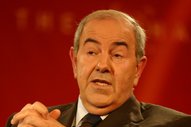 TIM SEBASTIAN
TIM SEBASTIAN
How can it be? Suspending people's rights, letting the secret police loose again.
AYAD ALLAWI
No, no, not loose again, but we need to bring law and order to the country.
TIM SEBASTIAN
Your former Defence Minister recommended chopping off insurgents' heads and hands. Do you want to go back to that sort of thing?
AYAD ALLAWI
No, not really.
TIM SEBASTIAN
Not really or not at all? It doesn't sound very convincing.
AYAD ALLAWI
No, no, not really, because you know, I tell you, the problem in Iraq now is the bloodshed, and we need to bring a stop to that. People, if you ask any person on the street whether in Mosul or Najaf or Basra or Kirkuk or Diwaniyah, their concern is not the constitution article no. 14, constitution article 108. Their problem is security, security for themselves, for their family, for their children.
TIM SEBASTIAN
And you would use force to re-impose security, even though it hasn't been working and the Americans have shown it can't work? You have the most powerful army the world has ever seen in Iraq, and it can't bring peace, so force isn't working, is it?
AYAD ALLAWI
Force does not work alone.
TIM SEBASTIAN
Well, they've been talking to insurgents as well.
AYAD ALLAWI
Force needs to be combined with talking to insurgents, with opening dialogue with the resistance, and likewise with activating the economical process.
TIM SEBASTIAN
The truth is, isn't it, Ayad Allawi, that the situation is spiralling out of control, and you have no answers for it?
AYAD ALLAWI
No, we do.
TIM SEBASTIAN
You blame the Maliki government, you blame the Americans, you blame the British, you blame everybody but you think you have some solution to this?
AYAD ALLAWI
The plan we put forward, I put forward, is very clear and understandable, and really it calls for Iraq to retrieve its institutions that are capable of facing the threats of the country, and to have an assertive foreign policy, to be strong and adamant, to work with the regional countries to form a security understanding that would involve everyone including Iran, and really to embark on a non-sectarian, building the institutions on a non-sectarian basis.
TIM SEBASTIAN
Sounds like distant dreams. You mention Iran there. Is the US going to hit Iran, in your view?
AYAD ALLAWI
I don't know, I'm not party to the political process of the decision-making in Iran.
TIM SEBASTIAN
You've met all the players, you've met Bush, you've met Cheney, you've dealt with the CIA for years.
AYAD ALLAWI
Yes.
TIM SEBASTIAN
What do you think?
AYAD ALLAWI
I don't think to attack Iran is the answer. I think this would only bring about some negative results. I think you need to have, I mean, the United States and the international community need to have a very clear-cut policy how to contain Iran, how to bring it to dialogue and how to make it respect the neighbours, including Iraq, to help Iraq to stabilise itself.
TIM SEBASTIAN
And a bit of brutality along the way ...
AYAD ALLAWI
Well, I mean, this is, you know, these are facts of life.
TIM SEBASTIAN
You don't rule out brutalities? It's time for brutalities?
AYAD ALLAWI
I don't rule out brutality, no, because, you know, this is a region which is very important for the world, for the peace in the world, and its stability is of prime importance, and we need to create stability in the region. You can see what the Palestinian/Israeli conflict have afflicted on the region. Now you have problems in Iraq and problems in Lebanon. You have problems in Somalia.
TIM SEBASTIAN
OK, so the Ayad Allawi administration would not be a kinder, gentler administration. Rough stuff. Iraqis need some brutality, that's your prescription?
AYAD ALLAWI
No. It needs a combination, to be very open and very honest, we need a combination as we did when I was Prime Minister, we used both. We tried to explain to people that, you know, there's not scope, no place for violence.
TIM SEBASTIAN
So carrot and a lot of stick?
AYAD ALLAWI
This is everywhere.
Ending sectarian
TIM SEBASTIAN
All right. We'll take another question, please, from Maheen Hyder. Could we have your question please?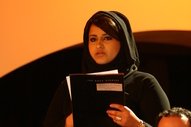 AUDIENCE Q (F)
AUDIENCE Q (F)
Mr. Allawi, how will you end the sectarian violence in Iraq and rid the country of the foreign insurgents?
AYAD ALLAWI
That's why I think one needs a strong government, a government that can build the institutions of the state including the police, the army and the security, and implement martial law and get rid of militias, and build the institutions on a basis of loyalty to the country, to the state, not loyalty to the sect or loyalty to the individual or to the party as is happening now.
TIM SEBASTIAN
But how do you do that when the police and army are infiltrated by the militias to the extent they are?
AYAD ALLAWI
Well, we could bring 30 to 40 percent out of the old army and police back into service as I did when I was Prime Minister. We could have some of the existing, 30 to 40 percent, because not all the existing is bad, some of the existing is good, some of the existing army and police, and we need to add them to the old ones and to create non-sectarian forces that can shoulder the threats that are posed on the country.
TIM SEBASTIAN
Are you convinced by that?
AUDIENCE Q (F)
Yes. Thank you.
TIM SEBASTIAN
OK. Gentleman in the row behind.
AUDIENCE Q (M)
I'm Iraqi. I've lived my whole life in Iraq until the war came, and I had to leave because my father was in the army, was a doctor in the army. Why didn't you wait for the change to come from the inside? People will change if they want to change. People weren't ready for the change. Secondly, you said the invasion was for democracy and bringing freedom to people and less torture. Now there isn't any voice in Iraq. If you say for example anything, like the other group will kill you, the government or the Americans, whoever.... you can't say anything in Iraq. There is no freedom. There was more freedom like when Saddam was President than there is now. Third thing is the resistance. Isn't for example if someone came to your house and took it over, wouldn't you have the right to resist and fight and ...
TIM SEBASTIAN
Let's let Dr. Allawi respond to some of those issues.
AYAD ALLAWI
First of all I don't know, you know, we were oppressed during Saddam's time. Even the Ba'ath Party suffered a lot of purges and a lot of assassinations and executions. Hundreds of Ba'athists, hundreds of army officers were executed. The Kurds were hit with chemical weapons. The people in the Marshes were destroyed, so I am totally surprised that you say, well, nothing happened during Saddam.
AUDIENCE Q (M)
I didn't say nothing happened.
AYAD ALLAWI
Let me finish. The problem is that during Saddam's time, we had absolute tyranny, we had violations of human rights, we had assassinations and killings, we had a lot of problems. Over and above the problems that we had as Iraqis, the country was thrown into a war, an 8-year war with Iran, and then an invasion of Kuwait, which is an Arab neighbourly state, for no reason. We don't know why Saddam decided to invade Kuwait. You cannot really compare what is happening now to under Saddam's time. I agree with you, the situation now is very bad, but also the situation under Saddam was very bad too. It wasn't that bright.
TIM SEBASTIAN (to questioner)
Briefly, do you want to come back?
AUDIENCE Q (M)
Saddam killed a lot of people, I agree with you, but he didn't kill anyone, he killed the people who were against him, but now everyone's dying, innocent people, people not in the resistance, people in the government.
AYAD ALLAWI
I don't think at Halabja when he gassed 5,000 to 6,000 people were people against him, children and families. I don't think this is right, what you are saying, my friend, and we need to be quite objective. Saddam gassed people and killed people left, right and centre, in bulk. He executed his comrades, his friends, people who were with him in the government, people who were with him in the leadership. He killed them for no reason because they just differed with him. I was a victim personally of an assassination attempt because I differed with Saddam.
TIM SEBASTIAN
All right, we're going to take a question from over there, the gentleman over there.
AUDIENCE Q (M)
Dr. Allawi, in light of the current clashes between the PKK and the Turkish Army as well as ...
TIM SEBASTIAN
Could we stay with the subject we're dealing with at the moment?
AUDIENCE Q (M)
Yes it is because I believe the issue of Kurdistan is very integral for Iraq and its stability, because there seems to be rising voices towards ceding from Iraq, and this would impact more the instability within the country, and I'm wondering if Dr. Allawi wins as Prime Minister, would he accept such a move towards independence from the Kurds?
AYAD ALLAWI
No, the Kurds are not advocating to disembark and dismantle the country. At least what I have been saying, I talk freely to both Masoud(Barzani )who is a very close friend of mine, and to Jalal Talabani, the President of Iraq. They haven't said that we want to separate from Iraq. Maybe these are ambitions that they do harbour for the future but for the current time, I cannot see and we don't allow this. They have been saying that they are part of Iraq, they want their federation. We concurred with that, we acknowledged that. We did not acknowledge the size of the federation nor the depth of what we mean by federation, but at least we acknowledged the principles that the Kurds are people within Iraq who have a special criteria, and this has been since 1970 by the Ba'ath Party, announced in 1970 accord with the Kurds. As far as Turkey is concerned, I think this is frankly the weakness of the government of Iraq. It cannot deal, it cannot restrain the presence of PKK who have been violating ...
TIM SEBASTIAN
And that is what you would do?
AYAD ALLAWI
Of course. Absolutely.
TIM SEBASTIAN
And how would you deal with Turkey?
AYAD ALLAWI
I imagine, you know, Turkey has a lot of interest with Iraq, has a lot of economic ties with Iraq, and Turkey has been very helpful to Iraqis during Saddam's time, and even now they have been very helpful in trying to support Iraq, but of course unfortunately because of the weakness of the government, the PKK took advantage of the situation and started challenging and threatening the national security of Turkey, which is unacceptable, and it shouldn't be done from Iraq territories definitely, and this is where the Iraqi government together with Masoud, when I met President Gul a few months ago before he became President, I called for direct dialogue between Masoud Barzani and Mr. Gul who was then the Foreign Minister, and the Iraqi government, to avoid clashes.
Dealing with insurgents and terrorists
TIM SEBASTIAN
All right, we're going to move on to a question please from Vladimir Jankovic.
AUDIENCE Q (M)
My question to Dr. Allawi is, if you took office one more time, you said that you were engaged in dialogue with the insurgents but not with the terrorists who killed innocent men and women. How do you differentiate between insurgents and terrorists?
AYAD ALLAWI
Insurgents are Iraqis who have been never involved in assassinations or mass killings of innocent civilian lives in Iraq. Insurgency, part of it is legitimate, part of it are Iraqis who have been disenfranchised, who have been neglected, who have been oppressed, and who had no solution but to fight on. This includes a lot of the ex-army which was dismantled, they were left without any pay, without any livelihood, without any work, and most of them are youth, and youthful, and they went into trying to defend themselves, defend their families, and this is how we made the distinction usually based on this criteria, and that's why when I spoke to the insurgents in Fallujah, my demands were very clear, that either you surrender Zarqawi and Al Qaeda to us, to the government, or we'll take them by force. 'You have two choices, either you help us or we will go in by force.' I remained engaged in dialogue with them, in my house, I was Prime Minister then, for two months and then they came and said, 'Well, we can't, we can't, they are too powerful and you have to take them by force,' and I moved, and I went myself to the front lines and I led the Iraqi Army. I'm not of course an officer, but we started without using the napalm or whatever bombs
TIM SEBASTIAN
It was phosphorous.
AYAD ALLAWI
... we never used this, never ever. And that's why many of them, of Fallujah people and Ramadi including the speaker of the Parliament now.
TIM SEBASTIAN
For ordinary people in the streets of Iraq, it doesn't make much difference whether it's a terrorist or an insurgent, they're still killing them, aren't they? You've got to deal with both of them in the end.
AYAD ALLAWI
Well, terrorists, you need to deal with them in a harsh way, because they really have been hurting the Iraqi people, they have been killing civilians, they have been executing, chopping heads and things which are very vulgar and unacceptable by any human standards, and this is a group that needs to be dealt with very fiercely. There is no other way in dealing with terrorists and terrorism, but with insurgency the solution really is political, it's not military, and this is where I can see now the American administration is convinced, that this is the route to sorting out the problem in Iraq, it's political, not military.
His vision for Iraq
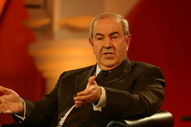 TIM SEBASTIAN
TIM SEBASTIAN
All right, we're going to move on to a question please from Vladimir Jankovic.
AUDIENCE Q (M)
My question to Dr. Allawi is, if you took office one more time, you said that you were engaged in dialogue with the insurgents but not with the terrorists who killed innocent men and women. How do you differentiate between insurgents and terrorists?
AYAD ALLAWI
Insurgents are Iraqis who have been never involved in assassinations or mass killings of innocent civilian lives in Iraq. Insurgency, part of it is legitimate, part of it are Iraqis who have been disenfranchised, who have been neglected, who have been oppressed, and who had no solution but to fight on. This includes a lot of the ex-army which was dismantled, they were left without any pay, without any livelihood, without any work, and most of them are youth, and youthful, and they went into trying to defend themselves, defend their families, and this is how we made the distinction usually based on this criteria, and that's why when I spoke to the insurgents in Fallujah, my demands were very clear, that either you surrender Zarqawi and Al Qaeda to us, to the government, or we'll take them by force. 'You have two choices, either you help us or we will go in by force.' I remained engaged in dialogue with them, in my house, I was Prime Minister then, for two months and then they came and said, 'Well, we can't, we can't, they are too powerful and you have to take them by force,' and I moved, and I went myself to the front lines and I led the Iraqi Army. I'm not of course an officer, but we started without using the napalm or whatever bombs
TIM SEBASTIAN
It was phosphorous.
AYAD ALLAWI
... we never used this, never ever. And that's why many of them, of Fallujah people and Ramadi including the speaker of the Parliament now.
TIM SEBASTIAN
For ordinary people in the streets of Iraq, it doesn't make much difference whether it's a terrorist or an insurgent, they're still killing them, aren't they? You've got to deal with both of them in the end.
AYAD ALLAWI
Well, terrorists, you need to deal with them in a harsh way, because they really have been hurting the Iraqi people, they have been killing civilians, they have been executing, chopping heads and things which are very vulgar and unacceptable by any human standards, and this is a group that needs to be dealt with very fiercely. There is no other way in dealing with terrorists and terrorism, but with insurgency the solution really is political, it's not military, and this is where I can see now the American administration is convinced, that this is the route to sorting out the problem in Iraq, it's political, not military.
Responsibility
TIM SEBASTIAN
Gentleman at the back. AUDIENCE Q (M)
AUDIENCE Q (M)
Mr. Allawi, a few minutes ago Mr. Sebastian asked you, 'You have no blood on your hands?' You answered him no. One million deaths or Iraqi casualties in Iraq since 2003, invasion of the United States to Iraq, it's the same invasion that you supported. I ask you, who do you hold responsible for these one million souls, and the answer is not Saddam Hussein because he was held captive by the US forces early December 2003.
AYAD ALLAWI
Thank you. I don't know from where you got this million casualties or dead in Iraq. I don't have these figures, but definitely there are numbers of people who have lost their lives. I can't pin down exactly what the numbers were and what the numbers are, but this is an unfortunate turn of events that happened in Iraq. It is the fault of all Iraqis and the fault together of the multi-national forces, and the fault of the ex-regime, of Saddam's regime. As I was saying earlier, if it wasn't the problems that Saddam has created in Iraq and the region and the world, and exposed the region to ...
AUDIENCE Q (M)
The US government was in charge when that happened.
AYAD ALLAWI
Which one?
AUDIENCE Q (M)
The US government was in charge.
AYAD ALLAWI
No, Saddam occupied Kuwait.
TIM SEBASTIAN
I think he's talking about much later.
AUDIENCE Q (M)
These casualties are since 2003, since the invasion, Saddam was no more in charge.
AYAD ALLAWI
I don't know from where you have the million ...
AUDIENCE Q (M)
So you said it's the fault of Iraqis, you blame Iraqis for these casualties.
AYAD ALLAWI
They are partly to blame, partly the Iraqis fault.
AUDIENCE Q (M)
Thank you very much, sir, I've made my point.
TIM SEBASTIAN
You say you blame Iraqis and you also wrote in your article, 'Who could have imagined that Iraq would be in such crisis more than four years after Saddam Hussein?'
AYAD ALLAWI
Yes, the Iraqi politicians are to be blamed.
TIM SEBASTIAN
No. The Intelligence Committee, the Senate Intelligence Committee in May said that months before the invasion of Iraq, US agencies predicted that it would be likely to spark violence, sectarian divides, and provide Al Qaeda with new opportunities in Iraq and Afghanistan, so they clearly predicted what was going to happen, so people did, there were plenty of warnings that this would turn into a bloodbath in Iraq, weren't there? Here is the Senate Intelligence Committee now releasing what US Intelligence agencies were telling them before the war started.
AYAD ALLAWI
I don't know how accurate the US Intelligence community should have been insisting on not dismantling the institutions in Iraq. I think the whole problem really came with dismantling the institutions.
TIM SEBASTIAN
But you say who could have predicted the violence. Well, they predicted the violence.
AYAD ALLAWI
Well, everybody predicted the violence or a certain degree of revenge, because then there was tyranny in Iraq but not to the extent that we are witnessing today, and had we preserved the institutions, nothing would have happened. Marginal, fractional of what has happened would have happened.
TIM SEBASTIAN
Let's take a question please from Shaikha Al Sowaidi.
AUDIENCE Q (F)
Dr. Allawi, are you in favour of the execution of the former Iraqi leaders?
AYAD ALLAWI
Not the way he (Saddam) was executed, not the fiasco of the trial. Definitely we would have wanted to see a fairer system, a trial of the whole era of tyranny so it wouldn't be repeated in Iraq or in the region, but unfortunately the way that this occurred was too bad and unpredictable. You know, the whole trial was a fiasco, it wasn't ...
TIM SEBASTIAN
But you're not against the death penalty?
AYAD ALLAWI
I'm not against the death penalty, no, that's all.
TIM SEBASTIAN
It was simply the way it was administered?
AYAD ALLAWI
The way, and the way the trial went. Yes, I'm not against, death penalty is death penalty. When you commit crimes, you have to face the consequences. The law of the land was about this law, you should apply it to anybody.
TIM SEBASTIAN
And Ali Al-Majeed?
AYAD ALLAWI
Al-Majeed was also a man who committed a lot of crimes but I am here ...
TIM SEBASTIAN
Does he deserve to die?
AYAD ALLAWI
It's not a matter of deserving or not deserving, but I am interested really in exposing tyranny so this will never repeat itself and this will be a lesson to all Iraqis, including the current rulers, including ourselves.
TIM SEBASTIAN
So you see the death penalty as a warning then to others?
AYAD ALLAWI
It should be a warning, yes.
TIM SEBASTIAN (to questioner)
Are you against the death penalty? I wonder what's behind your question.
AUDIENCE Q (F)
I am against the death penalty.
Women's rights
TIM SEBASTIAN
Thank you. We'll take a question please from Bashar Alani.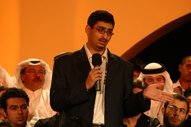 AUDIENCE Q (M)
AUDIENCE Q (M)
Dr. Allawi, women and children are often referred to as 'silent suffers', particularly in the case of Iraq. How do you propose to deal with the issue of women's rights, especially today with the resurgence of extremism in the Muslim world, and to what degree can women's equality be secured in Iraq?
AYAD ALLAWI
When we were in the Governing Council, we did pass a law to preserve the rights of women in Iraq. Unfortunately now with more extremes taking power, they are revisiting this and they want to change, reverse the situation. Women in Iraq have been very much engaged in the social daily life, political life in Iraq, and have been a very productive part of Iraqi society, and we are proud really to have their outstanding role in the past. We would like to preserve this role for women in Iraq but as you have pointed out yourself, there is frankly a problem between moderation and extremism throughout the Islamic world, and throughout the Arab World, and the liberals in the Arab World, those who are anti-extremism, should fight as hard as they can to bring sense and justice and equality to the societies we are in including in Iraq.
TIM SEBASTIAN
Can we stay with the issue of women's rights in Iraq? Is there someone who'd like to comment on women's rights in Iraq?
AUDIENCE Q (M)
You said that in your time as Prime Minister you made many reforms for women's rights and you also brought back former officers and many other things that would be, that the Iraqi people would support. If you did such things, then why did you get so little support in the 2005 elections?
AYAD ALLAWI
No, I didn't say that, 'in my time', I said in the Governing Council time. When there was a Governing Council in Iraq, we passed a law in Iraq which we won in the Government Council I think 14 to 6 in favour of women's rights, 6, they were trying to bring about rigid law to suppress women. This was in the Governing Council days, not in my time. I just carried on the orders and the laws which were brought by the Governing Council. I didn't invent them myself, but I voted for women's rights in the Governing Council, I was a member of the presidency of the Governing Council, and we voted for women's rights.
TIM SEBASTIAN
And what do you say to those women who now say that they enjoyed more secular freedom under Saddam Hussein than they get now?
AYAD ALLAWI
Well, I don't know, you know, we should not really, I mean, nobody could predict the future, nobody will have predicted during Saddam, as we were fighting Saddam, that we will end up what we have today.
TIM SEBASTIAN
You keep saying this but a lot of people predicted dire things.
AYAD ALLAWI
I don't think so. Even if the intelligence community predicted it, they should have been able to stop it. But they never did. What happened is really ...
TIM SEBASTIAN
But you know as well as anybody that governments don't always listen to their intelligence agencies, do they?
AYAD ALLAWI
But there was a very clear-cut majority in the United States not to dismantle Iraq and not to dismantle the state of Iraq, and likewise the British government and the other allies shared these views very much, but unfortunately today we have a different situation. You know, once Iraq was dismantled, the institutions, the doors were open to chaos and the country's sliding into chaos.
US troop withdrawal
TIM SEBASTIAN
On that note, can we have a question please from Safiullah Taye.
AUDIENCE Q (M)
My question is: what do you think will happen with Iraq if and when the US military leaves Iraq?
AYAD ALLAWI
We hope that there would be a formula to be worked out between the US and between the Iraqi government. That's why we, myself, we have been calling on the United Nations to have a much larger role and the Security Council to have a much larger role and I did write a letter to the American Administration, to the British Prime Minister Tony Blair and to Kofi Annan and some Arab leaders last December, to give an expanded role to the UN and to the Security Council, and under the UN and the Security Council, there should be the Arab League, the Islamic Conference Organisation and the Gulf Co-operation Council to co-operate with the UN, to bring about and to discuss the security requirements for Iraq.
TIM SEBASTIAN
Does that mean provide forces? You're looking to the GCC countries to provide forces in Iraq?
AYAD ALLAWI
To provide forces and to provide support for political reconciliation.
TIM SEBASTIAN
But they've shown no desire whatsoever to do that.
AYAD ALLAWI
Well, some did show a desire When I was around, a lot of countries were expressing, and the problem then was how we could really recreate the chain of command?
TIM SEBASTIAN
It took a long time to even visit Iraq. I mean, how long did it take the Arab League to get to Iraq?
AYAD ALLAWI
No, I went, I went myself. First visit I did to the Arab countries and met most of the leaders, and then the Saudis demanded that there should be an Islamic military presence in Iraq, but the problem then was the chain of command, and the US rejected to have a separate or a parallel chain of command, and they wanted to base whatever the United Nations decided, but I think this is an area where the UN could help a lot in restoring the stability to Iraq and helping the Iraqis ...
TIM SEBASTIAN
I think the questioner wants to come back on that.
AYAD ALLAWI
... to develop their own forces and their own capabilities.
AUDIENCE Q (M)
Sir, I don't think the US military asked your permission to occupy your country. If by leaving they do the same thing, what's going to be their situation inside Iraq?
AYAD ALLAWI
Well, it will be disastrous. If they leave prematurely without any preparations, without the UN taking charge or being in charge, without helping Iraq to build the institutions which are loyal to the country, then of course there will be massacres.
AUDIENCE Q (M)
So you admit you are not able to keep your unity between your people?
AYAD ALLAWI
Unfortunately as things stand now, it's very difficult. That's why we need to have a change and we need to get the country back on its feet, we need to get away from sectarianism and to build our forces, to be able to face the threats, and this is where we would look towards the international community to access some help, and also towards the region, and towards the Arab League and the Gulf Co-operation Council and the Summit Conference Organisation, under the auspices of the UN to be able to help Iraq to restore its capabilities.
Iran
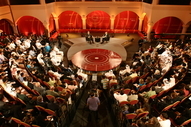 TIM SEBASTIAN
TIM SEBASTIAN
All right, gentleman over there.
AUDIENCE Q (M)
I'm from Iran and I want to ask you a question. What do you think about the violence in Iraq and what's the future of Iraq? Will Shia fight Sunnis and it will continue, because I don't see any movements on this. I see that if Sunnis kill Shias, and USA is watching and saying nothing about this.
AYAD ALLAWI
Sectarianism is a very dangerous route and a very dangerous situation that Iraq's facing, unfortunately. I mentioned earlier the three problems that have been created in Iraq, strategy problems, one of them was the sectarianism in Iraq. The Iraqi people, the Iraqi tribes, if you take any tribe at random, you will see that the tribe is, half of it are Sunnis and half of it are Shias. There is no kind of war between Shias and Sunnis, there are the militias, there are the parties, and unfortunate it is encouraged by both terrorists and by some unfriendly neighbours, neighbouring governments that have been encouraging sectarianism in Iraq, and the fights amongst the sects in Iraq.
TIM SEBASTIAN
All right, gentleman over there. You have a point to make on this?
AUDIENCE Q (M)
You kept repeatedly blaming the insurgency and the terrorists for encouraging sectarianism in Iraq. Don't you think that to some extent the political institutions are to blame? A recent example is the Americans setting up a police station overriding the Iraqi government's resistance to a predominantly Sunni police force in that region.
AYAD ALLAWI
This is what I just said. It's not only the insurgents, not only the terrorists, but some political groups in Iraq. We are the only group in the parliament, Iraqi parliament, who advocate non-sectarianism and non-sectarian Iraq.
TIM SEBASTIAN
But your government was based on sectarian quotas.
AYAD ALLAWI
Not really.
TIM SEBASTIAN
What do you mean, not really? Yes, it was.
AYAD ALLAWI
Not the first government, no, it wasn't. The first government was handpicked by the United Nations. I was given the choice to decide on some of the ministers, it was a totally agreed ministry by the United Nations and by the Governing Council, and frankly we never used the sectarian measure to administer the country. Sectarianism, we have been calling throughout for a non-sectarian Iraq, we think sectarianism is as bad as terrorism. We think that sectarianism would only spell violence, and we blame some political parties in Iraq for this plus the terrorist and plus some neighbours, who are trying to inflict this problem on Iraq.
AUDIENCE Q (M)
What way forward do you propose for this?
AYAD ALLAWI
A non-sectarian Iraq, a non-sectarian Iraq.
TIM SEBASTIAN
It sounds easy.
AUDIENCE Q (M)
Yes.
TIM SEBASTIAN
But how do you get there?
AUDIENCE Q (M)
That's a very big answer. You can't just say, everybody would answer the same way and say, 'We would prefer a non-sectarian Iraq.' There has to be a step-by-step way to get there.
AYAD ALLAWI
No, we are not saying, this is not our preference, this is our determination - to have the silent majority prevail in Iraq, the silent majority are not sectarian people. The silent majority of the Iraqis are against sectarianism, and this is what we want to bring again to Iraq.
AUDIENCE Q (M)
But how?
AYAD ALLAWI
Through two means. One is changing the composition of the government, and winning back the state of Iraq. This is the only way to bring about a non-sectarian Iraq. Sectarianism has been a disaster on the country and we have voted since the onset, since the days of the Governing Council.
Breaking up Iraq
TIM SEBASTIAN
Let's take another question.
AUDIENCE Q (M)
Iran has been constantly dominating terrorism within Iraq like the Mahdi Army, to trigger as many casualties as possible. Dr. Allawi, why is it that the Iraqi government does not stop the unhealthy relations with the Iranian government?
AYAD ALLAWI
This is a question to the government. I am not in the government any more.
TIM SEBASTIAN
Well, you'd like to be in government, you'd like to be Prime Minister again.
AYAD ALLAWI
That's why we say that we need to have an assertive foreign policy, a very clear foreign policy, to try and bring sanity to all parties in the region, to embark on a course of economic co-operation and good neighbourhood spirit, and to discuss through dialogue, constructive dialogue, the problems. This is what we achieved through the first Sharm El Sheikh conference in Egypt and this is what we did with the Syrians when ...
TIM SEBASTIAN
But you're not addressing the question. The questioner says Iran has been constantly dominating terrorist groups within Iraq. Are you just going to tell them to stop it and they'll lie down and accept it?
AYAD ALLAWI
No, you have to use a very assertive foreign policy.
TIM SEBASTIAN
Force?
AYAD ALLAWI
You have to use the UN and the Security Council. You have to make Iran accountable and answerable to the international community, not only to the United States, and you have to bring about a co-operation in the region between the moderate countries to bear pressure on Iran and to make Iran more responsible as a neighbour of Iraq.
TIM SEBASTIAN (to questioner)
Are you convinced by any of that?
AUDIENCE Q (M)
In a way, but not fully.
AYAD ALLAWI
We have been very open with Iran. In the initial period we had militias, they were finished, we didn't have any militias any more, because we had a very assertive foreign policy. We brought Iran to Sharm El Sheikh and we dealt to solve the problems of people who belonged to militias, and started building the institutions of the country. Iran of course, when Iran sees that there is destabilisation in the region, in the neighbouring countries, they would definitely intervene and interfere, and this is what has happened.
TIM SEBASTIAN
All right, we're going to a question from the lady at the back.
AUDIENCE Q (F)
Dr. Allawi, what do you think of the decision of the US Congress to split or separate Iraq?
AYAD ALLAWI
Although it's an unbinding decision, resolution, but my view really this is the, unfortunately the wrong concept of dealing with the problem in Iraq. I don't think this is going to be the solution. It will only flare up more violence in the country, it will breed and spill over more terrorists as well, also definitely increase the number of refugees. Already we have about four million refugees who have left the country, and it will only increase. That's why this is not the answer. This shows the frustration of some of the policy-makers in the United States, that they don't know what the answers are to the problems of Iraq. I think they should re-visit their strategies in Iraq as well as in the region, and we Iraqis are willing to help in any possible way to bring about resolutions which are in favour of stability and unity in the region, rather than dismemberment of the country.
TIM SEBASTIAN (to questioner)
What do you think of it?
AUDIENCE Q (F)
Well, for me, you brought the US to Iraq, so you should agree with them, right?
AYAD ALLAWI
I think Saddam brought them to be honest, it was not me. If Saddam did not invade Kuwait, if Saddam did not go to war with Iran, if Saddam did not use chemical weapons.
TIM SEBASTIAN
Well, you helped persuade the US to invade, didn't you?
AYAD ALLAWI
Well, well, unfortunately I ...
TIM SEBASTIAN
That was questioner's point.
AYAD ALLAWI
The question, I tried to convince the Arab World, to use my relations with the Arab countries and leaders, to bring about a solution to help Iraqis to implement change from within Iraq were not successful. We tried ourselves, we were either killed or assassinated or oppressed, so really there was the only option that was left was the so-called solution by the United States and the international community. Nobody expected what would have happened later on. All the decisions that have been taken then and the dialogue with the United States was very focused, very clear, no dismantlement of the institutions in Iraq, not leaving Iraq in a vacuum, unfortunately this did not happen.
TIM SEBASTIAN
So the US went back on its word, is that what you're saying?
AYAD ALLAWI
Well, it did not go, but it seems there were within the institutions of the United States, disagreements and ultimately the Pentagon had the lead, and the Pentagon decided to move on dismantling the institutions and the issue of de-Ba'athification in Iraq, which both were very wrong issues, extremely wrong.
Regrets
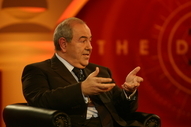 TIM SEBASTIAN
TIM SEBASTIAN
We'll take a question please from Raji Al Hammouri.
AUDIENCE Q (M)
Dr. Allawi, to what extent do you regret any of your practices during your term as Prime Minister?
AYAD ALLAWI
Not much really.
TIM SEBASTIAN
There was a lot of dying. Really, you don't regret that?
AYAD ALLAWI
Well, you know, Zarqawi and people like him, you can't just accommodate them and say, 'Welcome and inflict whatever losses you have on Iraq,' with militias who tried to take law and order and there was no way but to suppress them, and to have a dialogue with them. Those who repented and became part of the society, they were welcomed and we were very supportive to them. Indeed, the terrorists we tried to hit as hard as we can. I really don't have, the only regrets I have is that I should have expedited the return and the retrieval of the Iraqi institutions. I brought about 40, 50% back into service from the army and I got them back to the army and some I got to the police. I tried to retrieve the judiciary system. I brought the judges back and the judiciary as much as I could, provided protection to them, but unfortunately the successor government did a lot of purges. If it was left to me entirely and we had the means, I should have brought back everybody.
TIM SEBASTIAN
But you really don't have any regrets about the huge number of people who died on your watch? It was one of the most turbulent, bloody periods in recent history in Iraq.
AYAD ALLAWI
Mostly during the interim government.
TIM SEBASTIAN
It was the beginnings of what you now call the 'failing state.'
AYAD ALLAWI
Yes, but we tried to build the state.
TIM SEBASTIAN
A time of looting, a time of massive corruption.
AYAD ALLAWI
No, no, no, the looting happened before.
TIM SEBASTIAN
And a lot of corruption during your time.
AYAD ALLAWI
Not a lot, it was nothing compared to what we have now, and nothing compared to the last days of Saddam, the ten years of Saddam during the sanctions.
TIM SEBASTIAN
So you paint your period in government almost as this unique oasis of calm and goodness.
AYAD ALLAWI
No, it wasn't calm. We had Najaf, we had Sadr City, we had Fallujah, we had Mosul, we had Samara.
TIM SEBASTIAN
That's what I said, a lot of dying.
AYAD ALLAWI
We had lots of problems. I mean, either we should have left government or tried to bring stability to the country. I assure you, the areas we moved in, in Iraq, we moved in because of the demands of the people. I met with the people directly myself, whether in Sadr City or Najaf or Fallujah.
Dealing with the threat of assassination
TIM SEBASTIAN
All right, let's take a question from Nour Abuhadra.
AUDIENCE Q (F)
Dr. Allawi, the moment you walk out of any door you're a potential target for assassination. How do you deal with that in your everyday life?
AYAD ALLAWI
You know, this is something that we have developed a kind of resistance, you know. Since I was opposing Saddam in Iraq and when I left Iraq I was a victim of an assassination attempt, I was hospitalised for almost over a year, I still suffer some problems of that attack. The threats are continuing until now, but this is the duty we have to pay to salvage our country from the problems it is in now and that's it. This is fate and what God wants we are going to face, so there is no other alternative.
Proudest moments
TIM SEBASTIAN
A question from Khawla Ali please.
AUDIENCE Q (F)
As the first Prime Minister of Iraq following the toppled regime, what are the outstanding performances that you're proud of during your time in office?
TIM SEBASTIAN
Oh well, that's a question you'll like enormously, isn't it?
AYAD ALLAWI
What are the performances that we have done? Well, on the economy side, we stabilised the Iraqi currency, we controlled inflation, we increased the salaries, we reduced debts. We managed to get debts down by, of the Paris Club, 85% of the debts. We produced some very useful laws, such as the law of investment, the law of insurance. On the security side, we brought the militias to an end. We suppressed terrorist nests in Iraq, including the most important which was Fallujah. We did build a kind of institutions which were capable of facing the threats, army and police and intelligence.
TIM SEBASTIAN
Excuse me, Dr. Allawi, you built up an army in the time that you were there? How many combat-ready battalions have you had, between 2004 and 2005? If you built up the army, rebuilt the army, you would have an army in place now. There isn't an army in place now.
AYAD ALLAWI
Yes, they were purged, a lot were purged, after the successor governments came to power, they were purged, and then militias were brought in again and they were squeezed into the army and to the police to the extent that now some of the areas the police, 5% only are loyal to the state. And on security, this is what we brought Sharm El Sheikh meeting, we created a kind of vehicle through the UN to hold countries responsible, we developed tri-lateral co-operation with the Syrians and with the United States, to bring calm to the Syrian borders, which we did, we successfully did, but we did not finish the course by getting the rest of the army in, back into the military.
TIM SEBASTIAN
At the risk of interrupting your party political broadcast, can I just say, you say that the situation now requires an urgent commitment to moderation and ending sectarian violence by integrating all Iraqis into the political process.
AYAD ALLAWI
Yes.
TIM SEBASTIAN
This is fantasy, isn't it? There is simply no way under the current circumstances that you can bring this about. Iraq is too divided and too violent, to bring this about. Why won't you admit this?
AYAD ALLAWI
I have to disagree. We have now what we call the awakening in various parts of Iraq, in Anbar, we have in Diwaniyah, we have in Karbala, we have in Kut.
TIM SEBASTIAN
In the failing state you have an awakening?
AYAD ALLAWI
No, no, there is an awakening now in those areas and these important provinces, and what is happening really is, we need to integrate these guys and these people and these groups into the political process. This is where the current government is failing, and this is why I think ...
TIM SEBASTIAN
And you really think you would do any better than this government?
AYAD ALLAWI
Well, I don't know whether I'll do better or worse, but definitely I won't be sectarian. We have a very clear-cut programme. We did announce the programme and our programme really is to be as inclusive as possible in Iraq at the political process.
TIM SEBASTIAN
All right, we'll take a final question from Dina Mutassem.
AUDIENCE Q (F)
Dr. Allawi, knowing what you now know, would you still have supported the incursion into Najaf and Fallujah, and what do you say to those critics who claim this was a major crisis?
AYAD ALLAWI
Well, when we went into Najaf, this was based on the demands of the people in Najaf, and probably you have, I don't know whether you are familiar with what Sistani said in Najaf and what the people said in Najaf, that they want the Mahdi Army to leave Najaf, the shrines, they want people to lay down their arms and to leave Najaf as a whole, and this is exactly what I did, is that we had to clear Najaf of these guys and to get the shrines back to normality, and I was just responding to the requirement of the people and to law and order. And likewise in Fallujah, we had demands from the people in Fallujah to get rid of the terrorist nets which were built in Fallujah by Zarqawi and by Al Qaeda, and this is something that we need to do and we did.
TIM SEBASTIAN
All right. Well, Dr. Allawi, thank you very much indeed. We've come to the end of our time. Thanks to you for coming here. Thank you very much to our audience. The Doha Debates will be back again in December, we'll be broadcasting from the world-famous Cambridge Union, a very exciting prospect, so do join us then. For now though, from all of the team, have a safe journey home, good-bye. Thank you very much, good-bye.
Watch online

